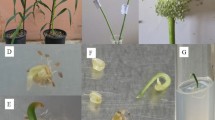Abstract
Our study concerns the different stages involved in the production of doubled haploid beet plants by in vitro gynogenesis. A histological study shows that the embryos obtained could come from the oosphere or the antipodals. Gynogenesis using male fertile plants gives nearly two haploid plants for 1000 ovules cultured: in this case, the problem is to avoid plating fertilized ovules. The gynogenetic plants obtained display an endopolyploidy phenomenon at the root meristem level while their shoot meristem remains haploid.
Colchicine doubling during in vitro vegetative propagation of buds has been carried out successfully.
Similar content being viewed by others
References
Artschwager E, Starrett RC (1933) Jour. Agr. Research 47: 823–843
Deuter M (1970) Genetica Polon. 11: 219–225
Dore C (1976) Ann. Amelior. Plantes 26: 647–653
Hosemans D, Bossoutrot D (1983) Z. Pflanzenzüchtg. 91: 74–77
Raquin C (1982) C.R. Acad. Sc. Paris 294: 335–338
Sangwan-Norreel B S, Duhoux E (1982) Rev. Cytol. Biol. Végét. Bot. 5: 171–187
San Noeum L H (1976) Ann. Amélior. Plantes 26: 751–754
Seman I (1982) Genetika a Slecht. 18(3): 169–174
Seman I (1983) Biologia 38: 1113–1122
Yang H Y, Zhou C (1982) Theor. Appl. Genet. 63: 97–104
Zhu Z, Wu H (1979) Acta Genet. Sinica 6: 181–183
Author information
Authors and Affiliations
Additional information
Communicated by A. M. Boudet
Rights and permissions
About this article
Cite this article
Bossoutrot, D., Hosemans, D. Gynogenesis in Beta vulgaris L.: From in vitro culture of unpollinated ovules to the production of doubled haploid plants in soil. Plant Cell Reports 4, 300–303 (1985). https://doi.org/10.1007/BF00269883
Received:
Revised:
Issue Date:
DOI: https://doi.org/10.1007/BF00269883




